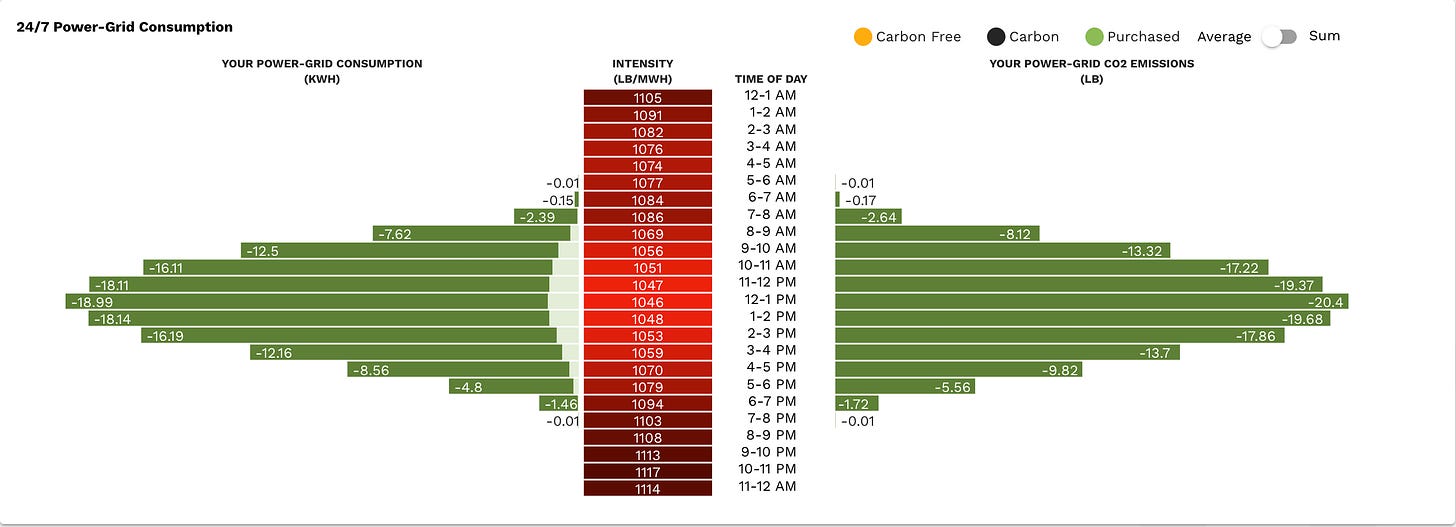New research out today shows that corporations and utilities sometimes engage in greenwashing. This is as shocking to me as it is to you, I’m sure.
“Renewable Energy Certificates threaten the integrity of corporate science-based targets” screams the headline. It’s a seductive premise, of course, and it feeds into general cynicism about ESG and sketchy offset schemes promoted by the likes of Exxon Mobil and friends. It’s also a disappointingly shallow conclusion from academics who should probably know better.
To be clear, there are valid critiques here. Namely,
some greenwashers claim 100% green energy when what they mean is that they buy enough solar or wind energy through the market to equal their total consumption; and
they don’t consider the difference between carbon emissions from consumed electricity and the carbon emissions avoided from produced electricity.
Consider the two following examples that I made up for the purposes of illustration here. The first is a hypothetical solar REC purchased from a solar farm in Daytona Beach, FL, where Florida Power mostly otherwise provides fossil fuel electricity. The second comes from California, where CAISO operates a 65% carbon-free grid during the middle of the day.
It doesn’t take a PhD to realize that the impacts of a REC would be very different in these two places. As you can tell, none of the solar production occurs at night and the solar production in California is displacing already pretty clean energy, while the solar production in Florida is displacing a filthy fuel mix.
While there are real problems with ambiguity in current carbon accounting practices (this is why we released our methods guide for how to handle these types of edge cases), breathless journalists have taken the opportunity to draw the worst possible conclusions that feed into the fear, uncertainty, and doubt (FUD) that stymies honest efforts to make progress toward decarbonization. (see, e.g., https://www.theverge.com/2022/6/9/23160508/corporate-renewable-energy-misleading-rec-power-purchase-climate)
Critics level their gaze chiefly at the concept of an “unbundled” Renewable Energy Credit (REC). You get unbundled RECs in states where utilities are not required to purchase renewable energy, so the environmental attribute gets sold separately from the electricity itself. The grid buys the electricity at the prevailing rate while a third party buys the environmental benefits. What ends up happening is that wind and solar energy projects get developed anyway and sold into the market at a lower price than fossil fuels, and corporations (or individuals) can bank the credit against their own carbon emissions.
It’s worth pointing out that this market success is a minor miracle. Today, you can profitably build and operate a wind or solar farm and still sell your energy for cheaper than what coal plants offer. And you do this without spewing harmful emissions that directly kill tens of thousands of people per year and account for nearly a third of global CO2 emissions.
A better policy solution than a REC would be a carbon tax, which would make the negative externalities of fossil fuel energy the responsibility of fossil fuel energy companies (instead of all of us bearing the burden). But, in lieu of that, an unbundled REC provides a reasonable way to level the playing field a bit more by paying for the public good portion of clean electricity sold into the grid and claiming credit for it. It’s kind of a way to say thank you to the solar or wind developer for providing an alternative source of electricity at a lower price that doesn’t destroy the planet. RECs are one of the few ways that we have to fight back against the fossil fuel lobbyists who prevent the types of sweeping policy changes that we really need from becoming law.
The other main criticism of unbundled RECs is that they are cheap, and therefore probably worthless. But the real reason they are cheap is that for too long we’ve been cavalier about the consequences of dumping massive amounts of CO2 into the atmosphere. Now finally, despite decades of minimal government action, private companies are recognizing the threat and trying to take action by buying RECs. That the response by these academics is to blame these companies for the problem in the first place is mind-boggling.
The asinine conclusions of the latest report notwithstanding, there are some real reforms that need to happen.
There’s a prevailing practice of conflating the purchase of clean energy with claims of being 100% carbon-free. This is greenwashing and needs to stop immediately.
REC generation needs to be coincident with consumption. You shouldn’t be able to use last year’s clean energy credit to offset this year’s pollution.
We must provide transparency around carbon accounting. If you are purchasing wind RECs from Texas to offset consumption in Kentucky, even if you match 100% of your usage you are not net-zero. Claims to the otherwise are simply wrong.
But the REC in and of itself isn’t the problem. It’s one of any number of pathways to net-zero that can be pursued alongside PPAs, onsite renewable generation, energy efficiency, building and transportation electrification, etc.
As we decarbonize the grid, we simply have to measure with more precision and not overstate the impacts of our actions. We can make reasonable assumptions in the absence of granular data, but there is no future in which payment mechanisms that reward the production of carbon-free energy are anything but salutary to our broader goals. Efforts to sow doubt only undermine the work being done to realize a more sustainable future for our planet.






Excellent info! Thank you for making this issue so easy to understand and helping us to be more savvy about utility greenwashing.